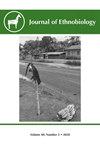传统农业与粮食主权:Quilombola对粮食作物的认识与管理
IF 1.3
3区 社会学
Q1 ANTHROPOLOGY
引用次数: 3
摘要
摘要在世界的一些地区,森林受到土著和传统人民的保护,他们的植物性粮食生产主要用于自我消费和在促进森林生物过程和作物多样化的基础上出售。在巴西大西洋森林,Quilombola群体是自15世纪以来一直保护和管理农业生物多样性的黑人社区。尽管人们对Quilombola食品厂的使用、生产和捐赠动态仍知之甚少,但这些过程可以帮助我们了解粮食不安全的脆弱性。我们分析了巴西南部Quilombola社区(São Roque Pedra Branca)与粮食供应相关的粮食安全,重点关注他们对当地生产的粮食植物的依赖。如今,São Roque的家庭依赖农业、政府福利、城市低薪土木建筑和一般助手工作。我们评估了Quilombola农民与种植物种和品种之间的互动,以及农民家庭在社区中的作用。该假说认为,生产、管理和保护更多当地物种和品种的农民也有助于减少社区内的粮食脆弱性。Quilombolas进行的小规模农业意味着对种间和种内高度多样性的管理。在2019农业年,在地块和花园中培育了42个物种,包括83个品种。大多数农民种植一部分主要物种和品种供自己消费和捐赠。种植品种最多的农民是捐赠最多的农民。在53%的家庭单位中发现了一些易受粮食不安全影响的情况。家庭之间的交流和捐赠有助于社区的粮食安全,但仍有家庭处于粮食不安全的境地。当地的农业生物多样性和已建立的交流网络加强了Quilombola的粮食主权。本文章由计算机程序翻译,如有差异,请以英文原文为准。
Traditional Agriculture and Food Sovereignty: Quilombola Knowledge and Management of Food Crops
Abstract. In several parts of the world, forests have been safeguarded by Indigenous and traditional people, whose plant food production is mostly for self-consumption and for sale based on the promotion of forest biological processes and crop diversification. In the Brazilian Atlantic Forest, Quilombola groups are black communities that have protected and managed agrobiodiversity since the fifteenth century. Although the dynamics of use, production, and donations of Quilombola food plants are still poorly understood, these processes can help us to understand the vulnerability to food insecurity. We analyzed the food security related to food availability in a Quilombola community in southern Brazil (São Roque Pedra Branca), focusing on their dependence on locally produced food plants. Today, São Roque families depend on agriculture, government benefits, and urban low-paid civil construction and general helper jobs. We evaluated the interactions between Quilombola farmers and the cultivated species and varieties and the role of farmer families within the community. The hypothesis is that farmers who produce, manage, and conserve more local species and varieties of plants also contribute to less food vulnerability within the community. The small-scale agriculture carried out by the Quilombolas implies the management of high inter- and intraspecific diversity. During the 2019 agricultural year, 42 species were cultivated in plots and gardens, comprising 83 varieties. Most farmers cultivate a subset of major species and varieties for self-consumption and donations. The farmers who grow the most varieties are the ones who donate the most. Some vulnerability to food insecurity was observed in 53% of the family units. Exchanges and donations between families contribute to the community's food security, but there are still families in a situation of food insecurity. Local agrobiodiversity and established exchange networks strengthen Quilombola food sovereignty.
求助全文
通过发布文献求助,成功后即可免费获取论文全文。
去求助
来源期刊

Journal of Ethnobiology
Social Sciences-Anthropology
CiteScore
4.80
自引率
3.40%
发文量
21
审稿时长
>12 weeks
期刊介绍:
JoE’s readership is as wide and diverse as ethnobiology itself, with readers spanning from both the natural and social sciences. Not surprisingly, a glance at the papers published in the Journal reveals the depth and breadth of topics, extending from studies in archaeology and the origins of agriculture, to folk classification systems, to food composition, plants, birds, mammals, fungi and everything in between.
Research areas published in JoE include but are not limited to neo- and paleo-ethnobiology, zooarchaeology, ethnobotany, ethnozoology, ethnopharmacology, ethnoecology, linguistic ethnobiology, human paleoecology, and many other related fields of study within anthropology and biology, such as taxonomy, conservation biology, ethnography, political ecology, and cognitive and cultural anthropology.
JoE does not limit itself to a single perspective, approach or discipline, but seeks to represent the full spectrum and wide diversity of the field of ethnobiology, including cognitive, symbolic, linguistic, ecological, and economic aspects of human interactions with our living world. Articles that significantly advance ethnobiological theory and/or methodology are particularly welcome, as well as studies bridging across disciplines and knowledge systems. JoE does not publish uncontextualized data such as species lists; appropriate submissions must elaborate on the ethnobiological context of findings.
 求助内容:
求助内容: 应助结果提醒方式:
应助结果提醒方式:


